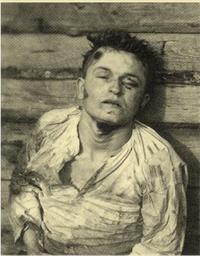
THE VOICE OF INTERNATIONAL LITHUANIA
|
VilNews has its own Google archive! Type a word in the above search box to find any article.
You can also follow us on Facebook. We have two different pages. Click to open and join.
|

One of the many killed Lithuanian partisans, Juozas Luksa – "Skirmantas", "Daumantas", after his death on the 4th of September 1951.
Photo: KGB
The inconvenient truth is that you in the West preferred not to know
I learned that the hard way, from my grandparents & other family who closely worked with Skirmantas and other top Lithuanian freedom war leaders in the Seinai-Punskas (Sejny-Punsk), Poland, during their secret border crossing missions to the West (via Gdansk and Warsaw) and back to Lithuania in 1946-50. My family was put in hard-regime prisons for that, all the hard earned property confiscated, and I was born a communist slave, so to speak. While in high school I rebelled against the Soviet occupation of Lithuania, was arrested and thrown out of school, persecuted for a long time by communist secret services, and finally made my way to the West: Glory Be to God!
Yours sincerely,
Valdas Samonis,
Canada
P.S. My family was decorated with Lithuania's top freedom medals by President Adamkus. I was officially recognized by free Poland (IPN) as the freedom activist persecuted by the communist regime.
__________________________
But the spirit of Lithuania is still not free
Hi Aage,
I found your article interesting and would like to get more of them. After looking at those young faces, who lost their lives for the freedom of Lithuania, I realize that these days we have freedom, but the spirit of Lithuanian is still not free, rather haunted by the past challenging experiences. I believe that eventually we will become free and will start feeling worthy again.
Sincerely,
Aušra,
USA
__________________________
In my opinion it is a mistake to confuse resistance to occupation and the second world war

The Second World War in Europe was a war fought against fascism – in particular the German variant exemplified by Nazism – and including also Italian fascism. The Second World War in Europe ended with the surrender of Germany; a surrender to which Russia was the major contributor because Germany was largely defeated at Stalingrad and Kursk and was always in retreat afterwards.
The Resistance in Lithuania against Soviet occupation was a heroic effort by some Lithuanians to obtain freedom for their country. In my opinion it is a mistake to confuse resistance to occupation and the Second World War. After the end of the Second World War there have been many occupations of many countries by Capitalist and Communist powers and each side has tried to characterise any resistance to its forces as an act of the 'Other' side.
Resistance to Occupation has a very long and courageous history in Europe and throughout the world and no 'side' has a right to claim the heroic activities of resistance fighters/activists to support its ideology. Inevitably that requires misrepresentation of the motives and objectives of the resistance; part of the theme of the book "The Ugly American" about the then developing Vietnamese war. It is also the type of misrepresentation that leads to one 'side' claiming "We are all Georgians now".
This misrepresentation is a major cause of the inability of 'Western' countries to think in any clear way about the activities grouped under the label of 'terrorism' and it is better to avoid such ideologically driven commentary/analysis.
Kindest Regards
Robert Jennings,
Ireland-Lithuania
__________________________
The ‘war against fascism’ was a construct intended to make the Soviet Union look good

Mr. Robert Jennings's letter, in which he claims that the Second World War was a war against fascism and nothing else, obfuscates the truth rather than clarifies it.
No one declared war on fascism. If they had, Spain and Portugal would have between attacked. The United Sates and other powers declared war against the axis powers. The "war against fascism" was a construct intended to make the Soviet Union look good and to disguise its own crimes. How was the Soviet invasion of Finland in 1939 a war against fascism? What about the forced incorporation of the Baltic States into the Soviet Union well before any war with Germany? What about the Molotov-Ribbentrop pact, which divided Eastern Europe between the Soviet Union and Germany? Would the Poles agree that the war was a war against fascism? Was the murder of the Polish officers at Katyn part of the war against fascism?
Neither Tony Judt nor Norman Davies, prominent historians of Europe, would agree that the conflict which only ended in 1989 with the fall of the Berlin wall was a "war against fascism."
Who benefits by such a formulation? Only the Soviets, whose crimes become excusable excesses of war. The independent Lithuanian government now considers the last anti-Soviet partisan commander, Jonas Zemaitis, to have been the Lithuanian head of state. It seems that L Beria considered him the same way because upon his capture in 1953, Zemaitis was transported to Moscow and interviewed by Beria who seemed to be seeking accommodation now that Stalin had died. However, both Zemaitis and Beria were executed that same year.
WW2 is remembered as a "good war", but this is a formulation that works only on the western side, where the allies came to help brave resisters such as the French underground. There were brave underground resisters in the East too, but no one ever came to help them. They fought until the dies, were captured, or gave up. Their story is just coming out now.
Antanas Sileika,
Canada
__________________________
Unfortunately you are giving some credit to the British intelligence

Thank you for the very moving story about the post WWII partisans. Unfortunately on page 6 you are giving some credit to the British intelligence, even though later on you mention Philby as having been responsible for the vicious death of thousands of the Baltic partisans. In fact the entire top levels of MI5 and MI6 since late 30's through early 70s were thoroughly penetrated by Britishers serving the soviet espionage services. Peter Wright in his book "the Spycatcher" identified Maclean, Burgess, Blake, Sinclair, Roger Hollis and numerous others who participated in setting up contacts with the partisans while assuring that the KGB was in full knowledge and control of their every movement and contact. Unfortunately, the doomed fighters sincerely believed for a long time that the British were on their side while being betrayed and delivered into the hands of the KGB.
In my view, it is also the British who have much to apologize to the thousands and thousands of victims for the vicious treachery in peace time of their MI5 and MI6 services.
Stan Backaitis
Washington, D.C. , USA
Category : Opinions
- Bookmark :
- Digg
- del.icio.us
- Stumbleupon
- Redit it
VilNews e-magazine is published in Vilnius, Lithuania. Editor-in-Chief: Mr. Aage Myhre. Inquires to the editors: editor@VilNews.com.
Code of Ethics: See Section 2 – about VilNews. VilNews is not responsible for content on external links/web pages.
HOW TO ADVERTISE IN VILNEWS.
All content is copyrighted © 2011. UAB ‘VilNews’.

 Click on the buttons to open and read each of VilNews' 18 sub-sections
Click on the buttons to open and read each of VilNews' 18 sub-sections 


